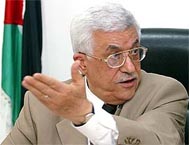Israeli foreign minister says Palestinian leader "not relevant" after Hamas victory
Palestinian leader Mahmoud Abbas is "not relevant" because of the victory of the militant Islamic Hamas in last month's elections and its takeover of the Palestinian parliament and Cabinet, Israel's acting foreign minister said Sunday.

Tzipi Livni spoke after meeting U.S. envoy David Welch, where they discussed how to relate to Abbas, the Fatah leader who is president of the Palestinian Authority, in light of the landslide Hamas victory over Fatah. Last week Abbas picked Hamas leader Ismail Haniyeh to form a new Cabinet.
Livni's harsh statement reflected an apparent difference in approach between Israel and the U.S. Israel Radio reported that Welch put forward a policy in which the U.S. would work with Abbas instead of the Hamas-led government, but Israel rejected that.
Livni told Israel Radio that Abbas "can't be a fig leaf for a terrorist authority. Abu Mazen can't be a pretty face for ugly terror that hides behind it." She said the Hamas government must decide about Israel's demands for recognition and renunciation of terror, and Abbas "in this regard is not relevant."
Without referring to the radio report, Micaela Schweitzer-Bluhm, spokeswoman of the U.S. consulate in east Jerusalem, said, "In terms of Abu Mazen (Abbas), we remain fully committed and supportive of him."
Israel and the U.S. both consider Hamas a terror group. According to its Islamic theology, Hamas does not recognize the existence of a Jewish state in the Middle East and has sent dozens of suicide bombers into Israel, killing hundreds.
Israel has suspended transfer of tax money it collects for the Palestinian Authority, and donor nations have threatened to cut off funds to the already cash-strapped Palestinian government when a Hamas Cabinet takes office. Though Abbas has pressed Hamas to accept interim peace accords signed by previous Palestinian regimes, Livni said the ban should extend to Abbas as well.
"Hamas is going to form the next government, and I think it would be a mistake to be consoled in the arms of Abu Mazen (Abbas) as the only legitimate leader," she said. "We are trying to deal with the reality as it is."
Haniyeh, meanwhile, denied saying Hamas would consider peace with Israel under certain conditions. A Hamas official said that was a mistranslation. He said Hamas is interested in a long-term truce. "I did not say anything about recognizing Israel," Haniyeh said.
Haniyeh was quoted by The Washington Post on Saturday as saying Hamas would establish "peace in stages" if Israel would withdraw to its 1967 boundaries before it captured the West Bank, Gaza Strip and east Jerusalem. It was the first time Hamas has been quoted as seeking peace with Israel.
Addressing reporters Sunday, Haniyeh said his comments had been misunderstood. He said he was not referring to a peace agreement, only a "political truce." Hamas official Sami Abu Zuhri told the Associated Press that Haniyeh's must have been mistranslated.
Haniyeh laid down a series of demands that Israel has ruled out, including a full withdrawal from lands captured in the 1967 Mideast war, the release of Palestinian prisoners and the return of several million Palestinian refugees and their descendants to Israel. "Then Hamas can grant a long-term truce," Haniyeh said.
Israel, while accepting the principle of an independent Palestinian state, has said many times that it has no intention of returning to its prewar borders or accept return of refugees.
Israeli Cabinet ministers on Sunday warned the international community against being tricked by Hamas' rhetoric.
Israel says it will refuse to deal with a Hamas government unless the group recognizes the Jewish state, disarms and accepts past peace accords with Israel.
Until Hamas meets these conditions, "everything else is empty words," said Cabinet Minister Roni Bar-On, reports AP.
O.Ch.
Subscribe to Pravda.Ru Telegram channel, Facebook, RSS!





